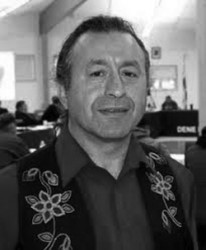Article Origin
Volume
Issue
Year
After 25 years serving as Dene Chief, Bill Erasmus is hoping to expand the legacy of his First Nations leadership by becoming the new National Chief for the Assembly of First Nations.
“I deal in the truth,” Erasmus, 58, said as an explanation as to why he is running. “People want a particular kind of leadership. I’m prepared to do the work and ensure that our lands are secure and that we’re protecting our sovereignty.”
The current national climate is of concern to Erasmus.
“I think we are in a very fragile situation where it is very volatile…. (First Nations) have many interests and rights and they’re not being put in effect. The whole issue for our people is the land and we’re being threatened by the way the Canadian government is treating us.”
Erasmus said the issue of Bill C-38 is of immediate concern.
The omnibus bill, which recently passed without amendment, is being widely criticized by First Nations leaders and environmentalists for its mandate to
slash currently implemented legislation that protects air, water and vulnerable wildlife. The bill is expected to introduce changes to over 70 existing pieces of legislation, including the Canadian Environmental Assessment Act, the Fisheries Act and Species at Risk Act. Bill C-38 impacts areas such as fisheries, employment insurance, immigration and environmental policies like the current controversial Northern Gateway oil pipeline and marine terminal project. Indigenous leaders say Bill C-38 will also impose a series of new regulations and policies that will alter opportunities for First Nations to examine and be engaged in the consultation and approval processes for major resource development projects.
Bill C-38, said Erasmus, is a major negation of the Crown’s obligations towards First Nations, as well as the obligation to accommodate the First Nations after a meaningful consultation.
†“They’re trying to impose the bill on us and they don’t have the ability to impose legislation,” Erasmus said. “Our people are sovereign people, we’re independent people. Canada tries to impose legislation on us and they can’t because we’re not subject to the Crown.”
A staunch environmentalist who is passionate about such issues as climate change, Erasmus says he is vehemently against the controversial Northern Gateway Pipeline project and expansion of the tar sands.
“As people from the Dene, we’ve been mandated not to support expansion of the tar sands because we’re being polluted by toxic chemicals,” he said, of the First Nations proximity to the sands and the polluting affects industry has on the community’s drinking water. “They’re polluting us and Canada is allowing it to happen. As independent people we have to run our own affairs and that includes everything. We are people of the land and environment is a huge issue for us.”
While Erasmus discounts Canada’s ability to impose certain legislation, he makes no apologies for his view that aspects of the Indian Act are needed.
“The Indian Act does protect us to some degree. It also protects our land so you can’t dismiss it,” he said.
“The whole issue with the Indian Act is that Canada doesn’t have authority to legislate our rights,” he continued. “(The Indian Act) was set up to regulate and it has gone way beyond that.”
Erasmus doesn’t support the Private Members Bill to repeal portions of the Indian Act legislation that was introduced last month by Saskatchewan Conservative MP Rob Clarke. Erasmus says the issue must be examined and debated further than the introduction of a bill.
“We need to sit down with the Crown and decide how we’re going move forward,” he said.
“Canada is not a nation, our people are Nations,” he added, pointing to the respect First Nations deserve when engaged in consultations with the Canadian government.
Along with his views on legislation debates and the environment, Erasmus says issues such as First Nations poverty, youth violence and social services also top his list of platform priorities.
Erasmus says more funding is desperately needed to provide essential social services such as support shelters and safe houses for youth.
He says gang violence and homelessness is a “volatile situation” that must be addressed through strategic measures that aim at rehabilitation and prevention rather than incarceration.
Furthermore, he asserts that First Nations people in Canada can transform what he calls the current “police state” mentality through enforcing inherent peace-keeping characteristics that are a part of being Indigenous.
Erasmus, who aided Mohawk leaders during the 1990 Oka crisis in Quebec and was recently acclaimed to serve another term as chief of the Dene Nation, has also been a member of the AFN’s executive committee since 1987. He currently serves as the Regional Chief of the Northwest Territories.
- 14281 views

